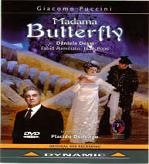This colorful production takes its entire approach from the fact that we are dealing with a girl/woman referred to as “Butterfly”. Let me explain: A mammoth flower–red for the wedding, green for the suicide–shows up as a backdrop. The set is either a somewhat hilly desert or a barren field seen through a microscope; there are two skeletal-like structures lying in the emptiness. We, the audience, are observing the world of insects. Our heroine is, of course, a butterfly. She enters under a wing/parachute-like structure; her chorus of maidens is a long, multi-headed caterpillar; Pinkerton is in black leather, wearing a cap with a point on it, clearly a scorpion; Sharpless is a cricket, with wrap-around shades and antennae on his hat. Heaven knows what Suzuki is; she’s many colors, with rosy cheeks. The baby is a red and black cute thing (looking about 9 years old) and, I think, a ladybug, but I could be wrong. Kate Pinkerton is just an ant–get it?–not special the way Butterfly is. A little black-clothed dancer wearing a white net (called the “dreamweaver” in the program) tucks the child and Suzuki in while Butterfly awaits Pinkerton’s return after the Flower Duet. Stefano Monti is credited with the production (and hypothesis, I guess); Arnaldo Pomodoro designed the sets and Guillermo Mariotto the costumes. Butterfly and Suzuki wear kimonos, the only acknowledgment to the opera’s Japanese subject matter.
Oh yes, the music and performance. The orchestra is second-rate and Placido Domingo conducts well, with natural pacing but with little insight or tension. Perhaps the excitement usually generated by Butterfly’s sighting of the ship is mitigated by the fact that there’s nothing for her to be gazing from, and she’s surrounded by sand. Daniela Dessi’s Cio-Cio-San is very good without being truly distinguished. She uses her plush, full-lyric voice well, but there’s no attempt at a little-girl demeanor (à la Callas or Scotto or dal Monte) either vocally or dramatically, although she is very effective in her death scene, and “Un bel di” is handsomely done. (The camera unbelievably cuts away to Domingo during the aria.) Fabio Armiliato’s Pinkerton is hard to take seriously, given his outfit, but he sings with ardor if not any special mark. Juan Pons’ Sharpless is dry-voiced but at least inflected; he’s duly disturbed during the second-act letter reading. Rosanna Rinaldi’s Suzuki is superb–committed and pointedly articulated. The rest of the cast and chorus are on a high level.
The sheer ingenuity of the whole creation is remarkable, and apparently those in power at the Puccini Festival in Torre del Lago see it as befitting the 100th anniversary of the opera’s premiere. Even though Puccini never actually visited Japan, I think we can safely conclude that he didn’t perceive it as a series of burrows out of which insects crawl. And so, if you think that this concept of what is perhaps the saddest opera in all of the popular literature will entertain or captivate you, perhaps you should have a look. Otherwise, this overview has so little respect for Puccini’s story and is so weird and detracts so thoroughly from the true action that even as a curiosity it isn’t worth examining. If you’re very quiet during this performance, you can almost hear Puccini looking away.
































